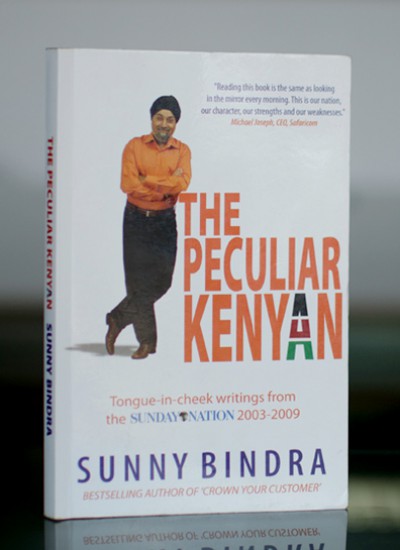The Peculiar Kenyan
“Reading this book is the same as looking in the mirror every morning. This is our nation, our character, our strengths and our weaknesses.”
Michael Joseph, Chairman, Kenya Airways
Sunny Bindra, Kenya’s renowned author and business adviser, has been regaling Kenyans since 2003 in his famous Sunday Nation column, “A Sunny Day”. His bold and contrarian writing has created much discussion and debate across the country and beyond.
Storymoja presents a collection of selected articles, all written with a light touch and with a twist of his trademark edgy humour. These pieces skewer all that is “peculiar” about Kenyans: our leaders, our businesses, our social mores. And as we laugh at ourselves, we gain a deeper understanding of what it means to be Kenyan.
Excerpt from the book
“If there’s one thing I can confirm after a lifetime of watching my fellow Kenyans and recording their behaviour, it is this: we are indeed peculiar. VERY peculiar. The odd, the strange, the eccentric and the outright bizarre are often very much the norm here. This has given me access to a huge pool of material for my column. Over the years, I have taken great pleasure in placing my tongue firmly in my cheek and writing about peculiar Kenyans. Which means most of us.”
“In fact, our peculiarity may be the one thing that unites us. At a time when our nationhood is in peril and we are retreating back into ethnic kingdoms, let us come out and celebrate the fact that whether we emerge from lakes, mountains or oceans we are uniformly peculiar! Anyone looking for a means of uniting Kenyans need look no further than our national eccentricities. Perhaps we have uncovered a national asset…”
“In Kenya, corporate people speak a language that sounds very important but means sweet nothing (“Our mission is to leverage multiple platforms.”). The NGO world, not to be outdone, has developed its own dialect of meaningless drivel (“A collaborative institutional framework between state and non-state actors.”). Politicians talk to voters as though they are addressing mentally ill ten-year-olds (“There is no corruption in Kenya.”). Our diplomats maintain an utterly fake dialogue with development partners, littered with noble-sounding but vapid phrases (“We are continuing a partnership between our countries based on mutual respect, to end global poverty.”). Both sides realise this, neither objects. Kenyans in posh jobs talk posh, but break out in Sheng the minute the boss isn’t listening. The disease of inauthenticity is in everyone.”


